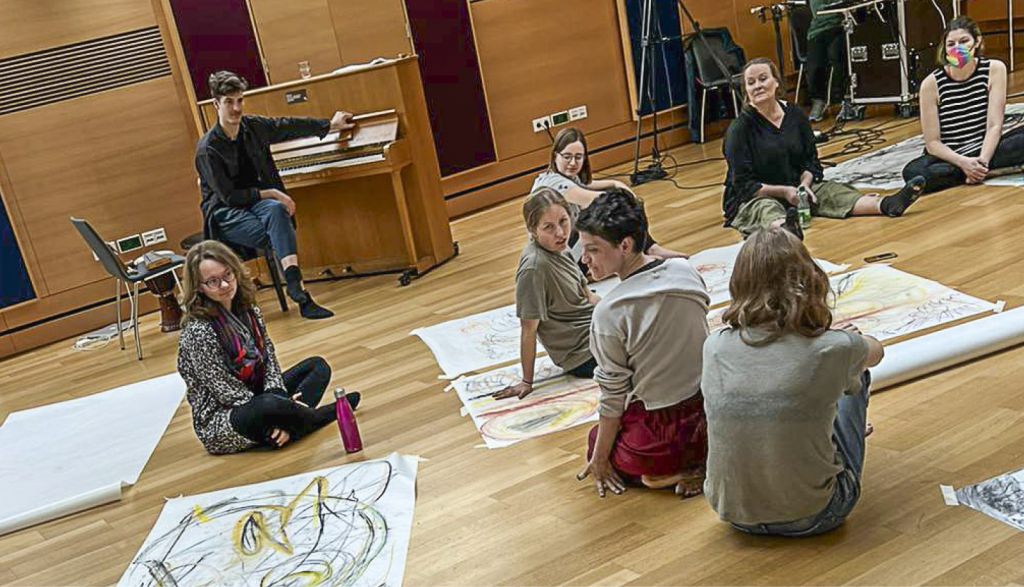Das Erasmus+-Projekt ALIISA, All In – International Inclusive Society in Arts, fand von September 2020 bis August 2023 unter Beteiligung der mdw sowie finnischer, litauischer und deutscher (Kunst-)Universitäten, Fachhochschulen sowie Musik- und Tanzschulen statt. ALIISA war ein Entwicklungsprojekt für innovative inklusive Kunstpädagogik auf Schul- und Hochschulebene und zielte vor allem auf zwei der von den Vereinten Nationen bis 2030 einzulösenden Sustainable Development Goals, der hochwertigen (auch musikalischen) Bildung und dem sozialen Wohlergeben für alle ab. Hanna Turunen von der Savonia University of Applied Sciences (Finnland) verfasste den Antrag. Bei dem Projekt sollte es vor allem um die Erhöhung der Qualität inklusiver Kunstpädagogik in den Curricula europäischer Kunstinstitutionen gehen.

Herausforderungen
Im Zentrum stand das auf zwei Semester angelegte und mit 5 ECTS berechnete Weiterbildungsmodell ALIISA Continuing Inclusive Art Education (ACIAE) mit multimodaler Lehre aus Workshops, Kontaktunterricht, Kleingruppenarbeit, Onlinestudien, Peer-Tutoring und berufsbezogenem Lernen für inskribierte Studierende. Herzstück von ACIAE war die Learning-, Teaching- und Trainingswoche (LTT). In Wien bestand die Austrian Edition aus Beate Hennenberg vom Institut für musikpädagogische Forschung, Musikdidaktik und Elementares Musizieren (IMP) und Hana Zanin, Maria Dinold, Helga Neira vom Inklusiven Tanzverein „Ich bin O.K.“, assoziiert war Robert Wagner von der Musikschule Fürth (Deutschland). Nach der vielseitigen LTT unterrichteten die Studierenden, von Lehrenden supervidiert, 45 Einheiten eigenständig in von ihnen gestalteten inklusiven Situationen. Am Ende erhielten die Teilnehmer_innen ein Zertifikat.
Aufgrund der Corona-Pandemie mussten Besprechungen auf Zoomsitzungen reduziert werden. Es war herausfordernd, anstelle der geplanten aktiven Begegnungen, die Workshops für Sensibilisierungen und jene mit vielfältigen Inputs für Tanz-, Musik- und bildendende Kunsterziehung, in denen Studierende und Künstler_innen mit und ohne Behinderung gemeinsam arbeiteten, online oder hybrid abzuhalten. Teilweise fanden die Online-Veranstaltungen über drei Länder hinweg statt. Positiv hervorzuheben ist, dass durch die Online-Version mehr als die angemeldeten Studierenden an Angeboten teilnehmen konnten, in Wien alleine waren es 60 Personen.
Forschung als Bestandteil der Intellectual Outputs
Zu den Intellectual Outputs, also die konkreten Ergebnisse des Projekts, zählten die Durchführung der Workshopwochen, die Entwicklung des länderspezifischen Weiterbildungsmodells, der Syllabus, die Transnational Meetings und Multiplier Events sowie zwei empirische Forschungen. Die erste war eine von Diana Strakšienė und Edita Muskienė von der Vilnius University Šiauliai Academy (Litauen) durchgeführte qualitative Fokusgruppendiskussion mit Studierenden, durch deren Einschätzungen die Konzepte für die zweite Hälfte des Projekts mitentwickelt wurden. Wertigkeiten wurden gesetzt auf den Nutzen des bisher gewonnenen Wissens für die berufliche Tätigkeit und auf die Bedeutung gemeinsamen Musizierens/Kunstausübens. Als positiv wurde insbesondere das Kennenlernen internationaler Praxisbeispiele wahrgenommen. Auch die Gemeinsamkeiten wurden von einem Teilnehmenden der Studie betont: „Wenn wir gemeinsam kleine Schritte machen und neuen Erfahrungen gegenüber offen eingestellt sind, können wir wunderbare und augenöffnende Dinge erreichen.“ Ein anderer Studienteilnehmer weiter: „Es war ein Privileg, an dieser pädagogischen Ausbildung teilzunehmen.“1
Beate Hennenberg und die Studienassistentin Denise Csida haben unter Mitarbeit von Ulrich Kropiunigg von der Medizinischen Universität Wien eine weitere Studie erarbeitet. Die Lehrenden reflektierten retrospektiv über Änderungen ihrer professionellen Kompetenzen während ALIISA. Die detaillierten Ergebnisse der Studie werden in einem Fachjournal veröffentlicht. Festgehalten werden kann schon jetzt, dass die Expert_innen ihre vielfältigen Arbeitsfelder eigenständig und kreativ den gesellschaftlichen Erfordernissen gemäß weiterentwickelten. ALIISA gestaltete sich als wichtiger Motor in den professionellen akademischen Tätigkeitsfeldern, etwas, das wiederum auf die Institutionen der Teilnehmer_innen zurückwirkt. Um hochwertige inklusive Bildung im tertiären und sekundären Bildungssektor sicherzustellen und voranzubringen, sei zum anderen stärkere aktive Arbeit in Berufsverbänden und politischen Gremien nötig.
Fazit
Das ALIISA-Abschlussymposium fand am 12. Juni im Joseph Haydn-Saal der mdw statt. Philologisch, philosophisch und musikpädagogisch wurden die Ergebnisse präsentiert. Mit ACIAE steht ein Weiterbildungs-Prototyp in der Art eines Baukastenprinzips bereit, der von europäischen Universitäten sofort adaptiert und genutzt werden kann.

